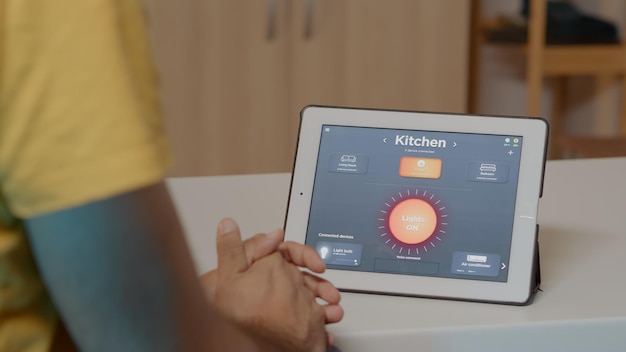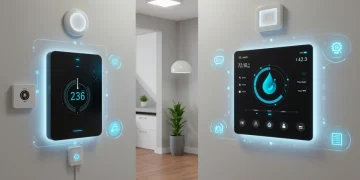The Future of Home Security: AI, Privacy, and Your Home

The future of home security revolves around AI-powered systems that offer enhanced protection and personalized experiences while navigating the critical balance with user privacy.
Imagine a home that anticipates your security needs, learns your routines, and protects your privacy. The future of home security: AI-powered systems and enhanced privacy is rapidly becoming a reality, promising smarter and seamless protection.
Understanding AI’s Role in Home Security
Artificial intelligence is revolutionizing home security, moving beyond simple alarms to intelligent systems that can analyze, predict, and respond to threats in real-time. These systems learn from data to better protect your home and family.
AI algorithms can differentiate between normal activity, like a pet moving around, and suspicious behavior, such as a person approaching the property late at night.
Enhanced Threat Detection
AI enhances threat detection by learning patterns and anomalies, which significantly reduces false alarms while increasing responsiveness to genuine threats. By analyzing various data points, AI can identify potential risks that traditional systems might miss.
Real-Time Monitoring and Response
Advanced AI systems provide real-time monitoring, alerting homeowners and authorities immediately when anomalies are detected. This quick response can deter criminals and minimize potential damage.

- Predictive Analysis: AI analyzes historical data to predict potential security breaches before they occur.
- Facial Recognition: AI-powered cameras recognize familiar faces and alert homeowners to unknown individuals.
- Voice Command Integration: Voice-activated systems allow homeowners to arm/disarm security with simple verbal commands.
The integration of AI in home security offers not just enhanced protection, but also a greater peace of mind, knowing your home is being monitored intelligently and proactively.
Privacy Concerns and AI Surveillance
While AI offers significant advancements in home security, it also raises critical privacy concerns. The constant monitoring and data collection inherent in AI systems can feel intrusive, and this data must be handled responsibly.
Concerns over data breaches and misuse by companies are valid considerations when choosing an AI-powered security system.
Data Collection and Usage
AI systems rely on collecting vast amounts of data, including video footage, audio recordings, and user behavior patterns. It’s essential to understand how this data is used, stored, and protected.
Potential for Misuse
Collected data may be misused, either intentionally or unintentionally, to violate users’ privacy. Hacking, data leaks, or even sale of user data to third parties are potential risks.
The balance between security and privacy is delicate, and homeowners must be aware of the potential trade-offs when implementing AI-driven security measures.
Balancing Security with Privacy: Best Practices
Balancing the benefits of AI home security with privacy requires careful consideration and adoption of best practices. Homeowners can take steps to mitigate privacy risks while still enjoying enhanced security features.
Choosing reputable brands with transparent privacy policies is an important step towards protecting your data and personal information.
Choosing the Right Systems
Select security systems that prioritize user privacy and offer robust data encryption. Look for certifications from independent organizations that verify data protection standards.
Customization and Control
Opt for systems that allow customization of data collection settings, enabling you to control what data is captured and stored. Systems that give you more control minimize potential privacy intrusions.

- Encryption: Ensure data is encrypted both in transit and at rest, protecting it from unauthorized access.
- Two-Factor Authentication: Activate two-factor authentication to add another layer of security to your account.
- Regular Audits: Perform regular audits of your security settings and data usage to identify potential vulnerabilities.
Implementing these best practices helps strike a balance between top-notch home security and the need to protect personal privacy.
Future Trends in AI-Powered Home Security
The future holds even more advanced and sophisticated AI-powered home security technologies, with features that are more seamless, proactive, and personalized.
As AI continues to evolve, expect systems that not only detect threats but also proactively prevent them, creating a safer environment for homeowners.
Edge Computing
Edge computing shifts data processing from centralized servers to local devices, improving response times and reducing the amount of data sent to the cloud, thereby enhancing privacy.
Biometric Authentication
Integration of biometric authentication, like fingerprint or iris scanning, adds another layer of security, ensuring only authorized individuals can access the property.
Integration with Smart Home Ecosystems
Seamless integration with other smart home devices, like lighting and thermostats, allows for a unified security strategy that responds dynamically to changing conditions.
The trends point towards a future where home security is not only smarter but also more adaptable to individual homeowner needs and preferences.
Cost-Benefit Analysis of AI Security Systems
Investing in an AI-powered home security system represents a significant decision, and assessing the cost-benefit ratio is critical. While initial costs might be higher, the long-term benefits can outweigh the expenses.
Consider the potential savings from reduced insurance premiums, decreased risk of theft, and enhanced peace of mind when evaluating the true cost.
Initial Investment vs. Long-Term Savings
Consider the upfront cost versus potential savings in insurance premiums or damage from security breaches. AI systems can provide long-term savings by preventing costly incidents.
Scalability and Flexibility
Choose systems that offer scalability, allowing you to add or remove features as your security needs evolve. Flexible systems provide better long-term value.
Maintenance and Updates
Factor in ongoing maintenance and update costs. Systems that offer remote updates can save time and money while ensuring optimal performance.
A thorough cost-benefit analysis will help homeowners make informed decisions that align with their budget and security priorities.
Making Informed Decisions for Your Home
Choosing the right AI-powered home security system requires careful consideration of individual needs, budget, and personal preferences. By weighing the benefits and risks, homeowners can make informed decisions that provide enhanced security without compromising privacy.
Evaluate your specific security needs and priorities before committing to a particular system or provider.
Assess Your Security Needs
Evaluate your home’s vulnerability and the types of threats you are most concerned about, like burglaries, vandalism, or package theft. Choose systems that address those primary concerns.
Research Providers and Products
Conduct thorough research on different providers and products. Read reviews, compare features, and evaluate their track record regarding security and privacy.
Prioritize Privacy Settings
Prioritize systems that offer robust privacy settings and allow you to control how your data is collected, stored, and used. Always read the privacy policy carefully.
Equipped with the right knowledge and due diligence, homeowners can confidently navigate the evolving landscape of AI-powered home security, creating safer and more secure living spaces.
| Key Point | Brief Description |
|---|---|
| 🛡️ AI-Powered Security | Uses algorithms for real-time threat detection and response. |
| 🔒 Privacy Concerns | Involves data collection, usage, and potential for misuse. |
| ⚖️ Balancing Security and Privacy | Requires choosing the right systems and customization. |
| 💡 Future Trends | Includes edge computing, biometric authentication, and smart home integration. |
Frequently Asked Questions
▼
AI enhances home security systems by providing real-time threat detection, reducing false alarms, and predicting potential security breaches through analyzing historical data.
▼
The primary privacy concerns include extensive data collection, the potential for misuse of personal data, and the risks associated with data breaches and unauthorized access.
▼
To balance security with privacy, select systems that offer robust privacy settings, prioritize data encryption, and allow customization of data collection according to your preferences.
▼
Future trends include edge computing for faster data processing, integration of biometric authentication for enhanced security, and seamless integration with other smart home ecosystems.
▼
Consider the initial investment versus long-term savings, the scalability and flexibility of the system, and ongoing maintenance and updates costs to determine the real value of AI security.
Conclusion
The evolution of home security continues to advance, bringing forth AI-powered systems that offer unparalleled protection and convenience. While privacy concerns remain a significant consideration, homeowners can navigate this landscape by staying informed, choosing trusted providers, and actively managing their privacy settings. By balancing security with privacy, individuals can confidently secure their homes while safeguarding their personal information, ensuring a safer and more secure future.




